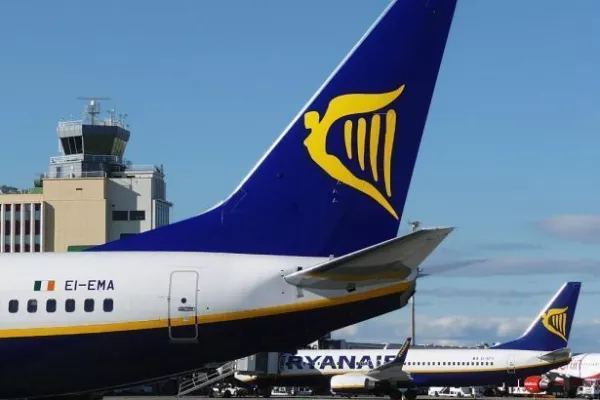Ryanair shares fell for a sixth straight day yesterday as investor concerns that the carrier’s surprise recognition of trade unions will sharply inflate labor costs outweighed a move by Irish pilots to suspend a planned strike.
The stock was trading 2.6 per cent lower at €14.55 at 3:23pm yesterday in Dublin, where Ryanair is based, following a 9 per cent slump Friday. On that day, Chief Executive Officer Michael O’Leary announced a softening of a longstanding anti-union stance, pushing the week’s decline to the steepest in 9 1/2 years and erasing prior gains over the course of 2017.
Credit Suisse downgraded the stock to “neutral” from “outperform,” citing concern that staff expenses will rise “significantly” beyond the €100 million forecast by Ryanair for fiscal year 2019. That could mean the carrier would lose much of its cost advantage over rival EasyJet, analysts including Neil Glynn said, cutting their price target to €16.18 from €19.32.
Ryanair last week reached out to fledgling pilot organisations in Ireland, the UK, Germany, Italy, Spain and Portugal indicating that it was ready to acknowledge them as representative bodies. A walkout planned for Italy on Friday was called off and the Impact union, which has been helping Irish pilots, late Sunday said it had agreed to meet with management on Tuesday.
Unions remain skeptical, though. Germany’s Vereinigung Cockpit said it will hold off on any walkouts until meeting with Ryanair management on 20 December. The pilots’ group is weary the company may merely be trying to buy time, union spokesman Markus Wahl said.
Market Leader
O’Leary’s change of tactics is evidence of the pressure pilots have brought to bear on the company since a rostering mixup boosted their bargaining power. The CEO scrapped 20,000 flights and pledged higher pay and bonuses to keep other services going. He also threatened to freeze benefits for strikers, but the pilots still held out for unionisation.
Not all analysts view the changes as so strongly negative. Stephen Furlong at Davy Holdings in Dublin cut his price target to €17 from €20 while maintaining his “outperform” rating, saying Ryanair costs should remain “materially below” those of competitors, continuing to spur growth.
“Perhaps it was inevitable that Ryanair’s market leadership position would lead to unionization,” Furlong wrote. “We have no doubt that it will remain the market-leading airline in Europe in terms of returns, cash flow generation and growth potential.”
Damian Brewer at RBC Capital Markets in London said in a note that there may be negative repercussions for other carriers as more pilots begin to push pay claims, “creating tensions for the entire industry.” Ryanair may at the same time find it easier to penetrate airports such as Paris Charles de Gaulle and some in Scandinavia if it comes to be seen as “more socially acceptable.”
Others say the lower value may mark a buying opportunity. The shares are now taking into consideration an “overly punitive” increase in staff costs of about 30 per cent, on top of the €100 million the airline had already flagged for better pilot pay, JP Morgan analyst Christopher Combe said in a note. “The market reaction at this stage appears overdone.”
News by Bloomberg - edited by Hospitality Ireland









